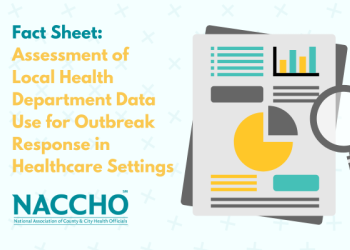Washington, DC, May 10, 2023 — The National Association of County and City Health Officials (NACCHO), with support from the Climate and Health Program at the Centers for Disease Control and Prevention, has awarded Franklin County Public Health in Ohio, San Juan Basin Public Health in Colorado, Tennessee Public Health Association, and a partnership between the Town of Natick and the City of Framingham in Massachusetts with $20,000 each to supplement ongoing climate change and health adaptation initiatives at the local level. Three of the four grantees serve small or rural jurisdictions.
Adaptation is an integral part of community resilience against the broad-reaching effects of unpredictable weather patterns attributed to climate change, the most obvious of which is the impact to human health. A recent climate opinion piece from the Yale Program on Climate Change Communication shows the percentage of Americans feeling “alarmed” about climate change and demanding immediate action has more than doubled since 2012.
Local health departments are strongly positioned to deliver education and outreach to residents on the health impacts of climate change, surveil and monitor health shifts, and implement necessary changes in response to specific risks in their jurisdictions. NACCHO will provide funds, technical support, and peer connections to help grantees advance climate adaptation and mitigation at the local level.
Franklin County Public Health (FCPH) will use the grant to develop a set of local climate and health-related indicators relevant to central Ohio. These indicators will help FCPH track changes over time, make projections, plan for the future, and raise awareness about the expected health impacts of climate change.
FCPH plans to adapt and scale previously developed environmental public health indicators from the national or state level to the local level and collaborate with local partners to identify indicators. These stakeholders will be engaged throughout the project period to gather continuous feedback. After completing the project, FCPH hopes to share its experience with other local health departments and organizations interested in developing their own set of local indicators.
San Juan Basin Public Health (SJBPH), the local public and environmental health agency for Archuleta and La Plata Counties, Colorado, will use this grant to incorporate the latest climate adaptation data into its official Public Health Improvement Plan and Public Health Emergency Operations Plan.
Climate risk has consistently been identified as a leading concern among community members in previous versions of these plans, but no climate adaptation actions have been incorporated. This grant gives SJBPH the opportunity to make these documents a model for local programs in Colorado moving forward. SJBPH will also use some grant funds to create demonstration sites for cooling and clean-air shelters, as wildfires and dust storms are anticipated to be the most frequent acute result of climate change in southwest Colorado.
Tennessee Public Health Association aims to address challenges that arise during statewide emergency responses, such as issues surrounding inefficiencies, limited resources, and lack of communication. The project will use the CDC BRACE framework to initially help the Chattanooga/Hamilton County community prepare for the health effects of climate change.
The project is replicable and will be rolled out statewide over the next year. Using climate data and projections with epidemiological analysis, the project team will develop climate planning and response tools and tabletop exercises specific to Tennessee to assist local health departments and their response partners prepare for, and practice responding to, extreme and unusual environmental events.
The Town of Natick and the City of Framingham in Massachusetts will partner to use the grant to proactively share climate readiness information with residents living in neighborhoods historically affected by environmental injustice in a culturally resonant way. As frontline communities, these residents are more vulnerable to climate change and typically have access to fewer resources to prepare for, and cope with, extreme weather.
Seeking out and respecting the experience and knowledge of these residents is critical to advancing climate equity. The Town of Natick and Framingham will hire multilingual residents living in these neighborhoods, known as “Community Climate Liaisons,” to co-design and co-promote climate readiness communication materials as part of the project.
To learn more about how NACCHO supports climate change work in local jurisdictions, visit naccho.org/climate-change.
# # #
About NACCHO
The National Association of County and City Health Officials (NACCHO) represents the nation’s nearly 3,000 local health departments. These city, county, metropolitan, district, and tribal departments work every day to protect and promote health and well-being for all people in their communities. For more information about NACCHO, please visit www.naccho.org.





